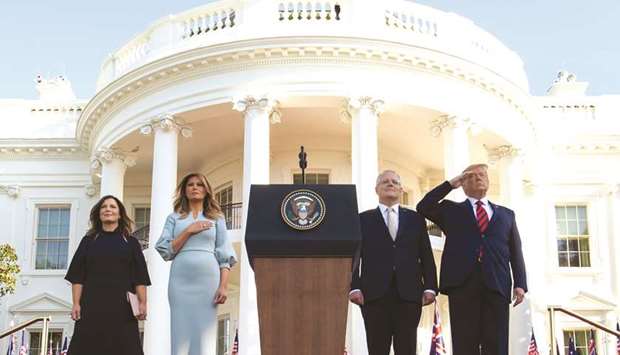President Donald Trump treated Australia’s Prime Minister Scott Morrison to a lavish White House visit yesterday celebrating their countries’ “unbreakable bond.” Meeting on the South Lawn under clear blue skies, Trump promised Morrison a state dinner later that will “be quite something.”
An honour guard, military band and 19 gun salute kicked off the visit, with the two leaders and their wives watching from a podium, before walking up to the White House’s South Portico balcony.
“Australians and Americans understand each other like few other peoples,” Morrison replied to Trump, adding that he and the Republican had also “established a very early understanding.”
The rare event — only the second state-level visit under Trump and the first for an Australian premier here since John Howard in 2006 — will feature similar mutual appreciation throughout the day. Trump and Morrison agree on curbing asylum seekers, playing down climate change fears, pushing back against Iran, and excluding China’s Huawei from their 5G phone markets. This is “one of our strongest and most enduring relationships anywhere in the world,” a senior Trump administration official said Thursday, asking not to be identified. A more complicated issue is the growing challenge to both countries from China and the shocks from Trump’s trade war with the US economic superpower rival. In June, Morrison warned of smaller economies suffering collateral damage and of the global system coming “under real pressure.”
However, at the White House he indicated broad agreement with the US push against China, saying “we need to make sure that we all compete on the same playing field.” China can’t have “special rules,” he said.
Trump’s relations with the previous Australian premier, Malcolm Turnbull, got off to a bad start.
But Morrison will cement his place in a growing conservative club — also including the likes of Brazilian President Jair Bolsonaro and British Prime Minister Boris Johnson— drawn into Trump’s orbit.
In addition to yesterday’s festivities, Morrison and Trump are due to reunite tomorrow for a visit at a new Australian-owned factory in Wapakoneta, Ohio, that the White House says will “demonstrate the strong trade and investment relationship.”
Trump has defied controversy over his push to prevent illegal immigrants and asylum seekers from crossing the Mexican border. Similarly, Morrison, a former immigration minister, has worked to make Australia less attractive to would-be asylum seekers.
His Liberal-National coalition also has much in common with Trump’s climate change skepticism, rejecting overwhelming scientific warnings to encourage lucrative fossil fuel industries. Australia is the world’s largest coal exporter.
Australia has joined Trump’s coalition to patrol the Strait of Hormuz. One area that Trump especially appreciates is trade where the United States enjoys a surplus. The trade conflicts proliferating under Trump have bypassed Australia.
The administration official said that co-operation between Australia’s space agency and Nasa on a return to the Moon and joint efforts to ensure “stable and secure” access to rare earth metals will be on the agenda.
But the relationship gets more complicated over how to deal with China.
Under Trump, the United States has embarked on what some are comparing to a new Cold War with its rival economic superpower.
Huge trade tariffs and growing competition in the military-strategic sphere are sending ripples through the entire Pacific region.
As China rises, there are even worries in some quarters that Australia may not always be able to rely on its US security umbrella.
A hard-hitting report from the United States Studies Centre at the University of Sydney in August said the US military is an “atrophying force” that is “dangerously overstretched” and “ill-prepared” for a confrontation with China.

US President Donald Trump, First Lady Melania Trump, Australian Prime Minister Scott Morrison and his wife, Jennifer Morrison, stand for the National Anthems during an arrival ceremony for an Official Visit on the South Lawn of the White House in Washington, DC, yesterday.
